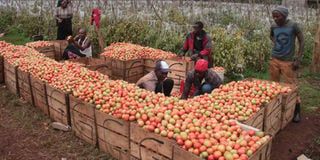How Kenya can unlock export opportunities

Farmers sort tomatoes for sale. Experts have called for food safety for Kenya to unlock export opportunities. PHOTO | FILE | NATION
For Kenya to achieve sustainable market access for local sales and exports, all stakeholders in the food value chain have to ensure the highest level of safety and hygiene.
Dr Johnson Irungu, the director of the State Department for Crop Development and Agricultural Research, said food-borne diseases remained a key problem in Kenya.
Speaking at a food safety session organised by the International Potato Centre last week, Dr Irungu told the meeting that brought together representatives from the ministries of Agriculture and Health, food science experts and nutritionists that approximately 70 per cent of all cases of diarrhoea in the country were attributable to ingestion of contaminated food and water.
“Food safety is important in order to minimise hazards that may make food injurious to the health of the consumer. It, therefore, involves handling, preparation and storage of food in ways that prevent food-borne illness,” said Dr Irungu.
The experts were concerned about the increasing public concerns about food safety and hygiene in the country and shared possible solutions. Africa has the world’s highest per-capita rate of food-borne illnesses and this problem is not being adequately addressed.
WHO says food-borne hazards are responsible for 137,000 deaths and 91 million acute illnesses in Africa every year, mostly affecting children under five.
In Kenya, media reports, like NTV’s exposé on red meat, continue to sound the alarm on most foods, revealing contamination at various points in the value chain.
Informal market sector in the food industry, Dr Irungu said, should be a centre of focus as it supplies at least 80 per cent of products to domestic markets.
Aflatoxin poisoning was singled out as a key concern for many parts of the country and East Africa. For example, in 2004 in Eastern Kenya a total of 317 cases were reported that resulted in 125 deaths.
According to Dr Irungu, maize samples from the affected area had aflatoxin B1 concentrations that were 220 times greater than that allowed.
Elsewhere, fatalities linked consumption of meat from Rift Valley Fever infected animals has caused public health concerns recently, an indication of the weaknesses of food safety control agencies in Kenya, he said.


